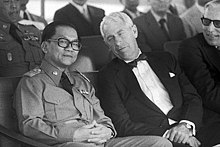Thanin Kraivichien
Thanin Kraivichien (also Tanin Kraivixien; Thai : ธานินทร์ ก รัย วิเชียร , RTGS : Thanin Kraiwichian, pronounced [ tʰaː.nin krai.wí.t͡ɕʰian ]; born April 5, 1927 in Bangkok ) is a Thai lawyer and politician. He was interlocutory 1976 and 1977 Prime Minister of Thailand . He then belonged to the Privy Council until 2016 .
Family and education
Thanin Kraivichien was born to Hae and Pa-ob Kraivichien. His father was a trader who had immigrated from China and owned one of the largest pawn shops in the Bangkok area.
Thanin initially trained at the Suan Kulab-Wittayalai School and then studied at Thammasat University in Bangkok Law . In 1948 he graduated there, but went to further studies at the University of London , where he made another degree in 1953. He was licensed as a barrister by the long-standing Gray's Inn Bar Association . He met Karen Anderson, a Danish woman who grew up in England, and married her. The two have five children.
Civil service career
After his return to Thailand in 1954, Thanin worked in the Justice Department as an associate judge and rose rapidly. Eventually he became the presiding judge of the country's Supreme Court. During this time he also taught at Thammasat University, Chulalongkorn University and the Bangkok Bar Association. As a sideline he wrote books warning of the dangers of communism.
After the democratic uprising against the military dictatorship in October 1973 , Thanin was a member of the legislative assembly appointed by the king. He became a member of the extreme right-wing and anti-communist Nawaphon movement. He had a television show attacking communism, the student movement and progressive politicians.
Term of office as Prime Minister
After the massacre at Thammasat University on October 6, 1976, the Democratic Prime Minister Seni Pramoj handed power to a military junta under the leadership of Admiral Sangad Chaloryu . On October 8, 1976, King Bhumibol Adulyadej named his favorite Thanin Prime Minister. Thanin insisted on choosing his own cabinet and rejected most of the proposals made by the military junta. The military only occupied the posts of Vice Prime Minister and Deputy Minister of Defense. Thanin was considered honest and intelligent, on the other hand as extremely ideologically and politically extreme. After taking office, he sent special police forces to bookshops with liberal literature and had 45,000 books confiscated and burned, including works by Thomas More , George Orwell and Maxim Gorki .
Among other things, Thanin was responsible for the construction of 20 hospitals in rural development areas of the country. Against the background of developments in neighboring countries and an influx of left-wing groups in the country, his government was primarily known for its fight against all left-wing movements in the country. He announced that the country could only return to a democratic constitution after 12 years.
Parliament was dissolved and all political parties were banned. Thanin's repressive actions against unions and progressive student and peasant associations drove their activists into the underground structures of the Communist Party of Thailand . Instead of weakening the communists, it fueled the armed struggle.
In March 1977, a group of younger, politically interested officers who called themselves " Young Turks " tried to overthrow Thanin. The coup attempt failed, however. On October 20, 1977, Admiral Sangad Chaloryu again seized power and Thanin Kraivichien had to resign. The military leadership justified this by saying that Thanin's government split the country and had no public support, the economic situation had deteriorated and the population did not agree with the long-term suspension of democracy.
Privy Council
King Bhumibol then appointed Thanin to his privy council . During the vacancy of the throne after Bhumibol's death on October 13, 2016, when the previous President of the Privy Council, Prem Tinsulanonda, was the interim head of state as regent , Thanin temporarily took over the presidency of the Privy Council. After the inauguration of the new King Maha Vajiralongkorn on December 1 of the same year, Prem was again President of the Privy Council. Thanin was no longer considered in Vajiralongkorn's new Privy Council.
Web links
- Biography (Thai)
- Kurzbiografie (English)
- History of Thai Prime Ministers
Individual evidence
- ↑ a b c d Nelson Peagam: Judge picks up the reigns. In: Far Eastern Economic Review , 1976, p. 407.
- ↑ Jim Glassman: Thailand at the margins. State power, uneven development, and industrial transformation. University of Minnesota, 1999, p. 239.
- ↑ Chris Baker , Pasuk Phongpaichit: A History of Thailand. 2nd Edition. Cambridge University Press, 2009, ISBN 978-0521-767-682 , p. 192.
- ^ Elliott Kulick, Dick Wilson: Time for Thailand. Profile of a New Success. White Lotus, Bangkok 1996, p. 27.
- ^ Baker, Pasuk: A History of Thailand. 2009, p. 194.
- ^ Chris J. Dixon: The Thai Economy. Uneven Development and Internationalization. London / New York 1999, p. 98.
- ↑ Chai-Anan Samudavanija: The Thai Young Turks. Institute of Southeast Asian Studies, Singapore 1982, p. 34.
- ^ Former PM Thanin appointed president of Privy Council. In: The Nation (online), October 20, 2016.
- ^ Yukako Ono: Thailand's new king appoints his privy council. In: Nikkei Asian Review (Online), December 6, 2016.
| personal data | |
|---|---|
| SURNAME | Thanin Kraivichien |
| ALTERNATIVE NAMES | Tanin Kraivixien |
| BRIEF DESCRIPTION | Thai politician, Prime Minister of Thailand |
| DATE OF BIRTH | April 5, 1927 |
| PLACE OF BIRTH | Bangkok |

